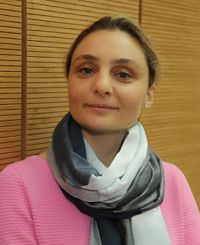Dr. Nino Paichadze is an experienced academic and public health researcher with more than 15 years of professional experience in medicine, public health, and trauma injury prevention. Her primary focus is on research and training related to the prevention and response to chronic conditions and injuries, especially in low- and middle-income countries (LMICs).
Dr. Paichadze’s work has included extensive international field experience, particularly in trauma and injury prevention. Her notable contributions include:
- Collaborating with academic institutions and trauma centers in the Russian Federation to improve monitoring and evaluation of road safety risk factors.
- Leading efforts to use mobile technology for data collection and data sharing to improve access to health data in global health systems.
- Spearheading the pilot study in Uganda to digitize injury and disability data collection, which later became a model for national mobile-based data collection systems.
She currently leads the FIC/NIH-funded trauma and injury program in Zambia and co-leads research and capacity-building efforts on non-communicable disease (NCD) risk factors and trauma in Zambia, Armenia, and Mali.
Research & Advocacy Efforts
Dr. Paichadze's research spans three key areas:
- Non-communicable diseases (NCDs) and their risk factors, focusing on the commercial determinants of health (CDoH) that influence public health, particularly in LMICs.
- Trauma and injury prevention, specifically through innovative digital health approaches and data systems to improve the prevention and monitoring of road safety and injuries.
- Capacity development in low- and middle-income countries for better public health data systems, training, and research methodologies.
She is currently the Principal Investigator (PI) on several NIH-funded initiatives focused on trauma and NCD prevention in Zambia and Armenia, and leads projects examining commercial influences on health in countries like Mali. Her work is critical in understanding how commercial determinants (such as the global food industry) impact health equity and the burden of diseases like NCDs in vulnerable populations.
Dr. Paichadze also co-leads the Center on Commercial Determinants of Health at GWSPH, collaborating with the World Health Organization (WHO) and Global Coordination Mechanism for NCDs (GCM/NCD) to develop tools for private sector engagement in NCD prevention.
Funding
Dr. Paichadze has been awarded substantial funding for her research and capacity development projects, including:
- FIC/NIH funding for trauma and injury prevention projects in Zambia (US-Zambia TIRP) and NCD risk factors in Zambia and Armenia (US-Zambia RiskNCD, ACCESS).
- NINDS/NIH funding for traumatic brain injury (TBI) research in Zambia.
- GWSPH funding for pilot projects that focus on mobile-based data collection for NCDs and commercially produced food consumption in Zambia.
- Research and capacity development programs across Uganda, Pakistan, Afghanistan, Mali, Zambia, and Armenia, with a focus on public health systems strengthening and data management.
These projects integrate data-driven solutions with capacity-building to improve health outcomes and research infrastructure in LMICs.
Educational Background & Clinical Training
Dr. Paichadze holds an impressive academic background in both medicine and public health, with advanced training in epidemiology, health systems, and global health:
- MD from Tbilisi State University, Georgia
- MPH from Johns Hopkins Bloomberg School of Public Health
- Postdoctoral fellowship in public health research at Johns Hopkins University
She has taught undergraduate and graduate-level courses on topics such as global health study design, injury and global public health, and commercial determinants of health at GWSPH. She is also actively involved in academic advising for DrPH and PhD students.
Industry Relationships and Collaborations
Dr. Paichadze’s work is supported by several prestigious institutions and organizations committed to advancing global health research and capacity-building:
- World Health Organization (WHO): Collaborating on projects related to commercial determinants of health and global NCD prevention.
- George Washington University: As an Associate Research Professor in the Department of Global Health, she is an integral part of several global health initiatives and faculty-led projects.
- Bloomberg Initiative for Global Road Safety: Leading efforts to improve road safety data collection in Uganda and contributing to the development of mobile data collection systems.
- NIH/FIC: PI of several NIH-funded projects focused on trauma and injury prevention in Zambia and NCD risk factors in Armenia and Zambia.
Her collaborations with international organizations, academic institutions, and global health experts help her develop and implement sustainable public health solutions across the globe.
Accolades & Recognitions in Global Health
Dr. Paichadze has been recognized for her contributions to global health research and capacity development, receiving accolades for her role in data-driven health solutions and injury prevention in low-resource settings. Some of her notable achievements include:
- Principal Investigator for NIH-funded programs on trauma and NCD prevention in Zambia, and leading capacity development efforts in Armenia and Mali.
- Co-leading the Center on Commercial Determinants of Health at GWSPH, a leading institution in advancing commercial health determinants research.
- Her role in digital health and mobile data collection systems, particularly in countries like Uganda, has been recognized for transforming injury and disability surveillance in LMICs.
- Academic leadership in global health education at George Washington University, where she serves as a mentor to PhD, DrPH, and MPH students.
Dr. Paichadze’s work continues to shape global public health policy and research capacity, with a particular emphasis on health equity, data innovation, and sustainable health systems.
View Dr. Paichadze's profile at Milken Institute School of Public Health
